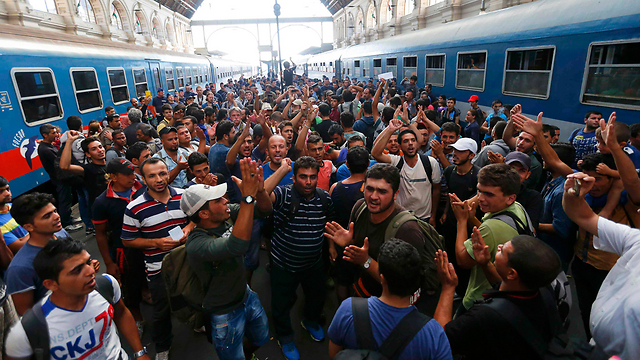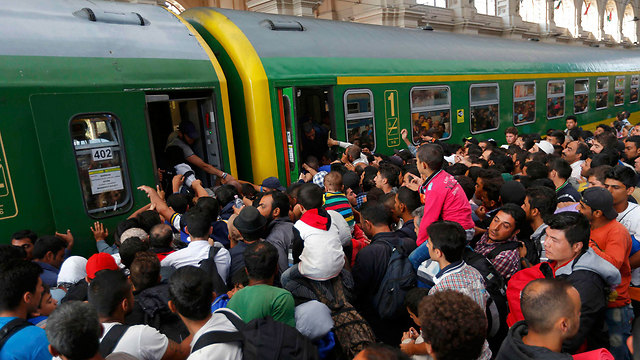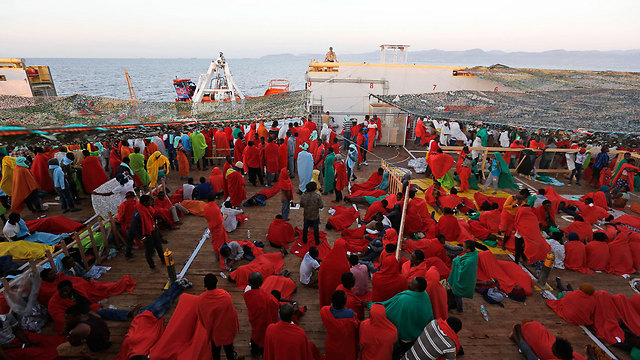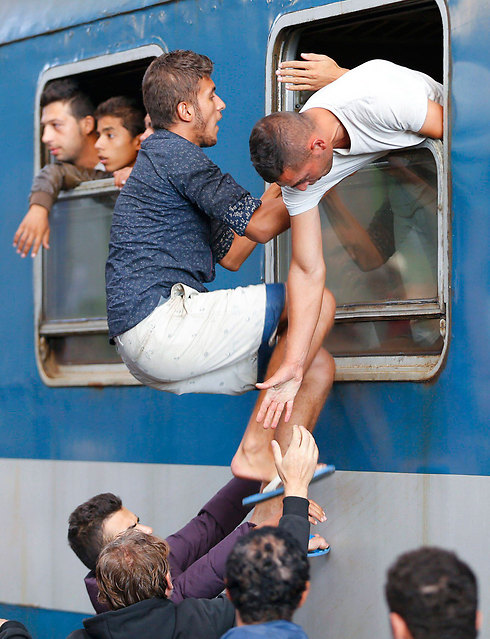
A tsunami warning for Europe
Op-ed: The refugee crisis in Europe is, strangely, giving new life to old borders. Not long ago, Europeans condemned Israel for building fences; now they are learning from us. In Israel, people complained that there was no policy; this week, Hungary changed its policy on a daily basis.
They are the ones who lost a home, family, their familiar surrounding, culture, language, and friends. One toddler washed ashore this week. Thousands of others have drowned in the Mediterranean Sea. But they continue, because they have nowhere to go back to. They are those who fled the terrorizing and murderous rule of global jihad and its offshoots, from the Taliban to the Islamic State.
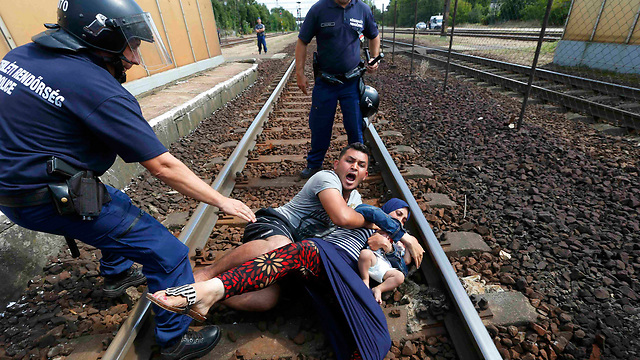
Professor Arnon Soffer has for years claimed that this tsunami was on the way. Now he claims it's only the beginning and that the real tsunami has not yet arrived. Climate change, poverty, and wars will lead to migration of several million people. The south will stream in masses to the rich north. Africa will in a decade grow from a population of one billion to 1.5 billion. And they have less and less water – 800 lakes have already run dry. They will escape to any possible place.
And what about the Middle East? There, too, says Soffer, the political changes go hand in hand with climate change. The thawing ice in the Himalayan Mountains will accomplish whatever the Taliban does not. Another climate crisis on a continental scale. In Syria, 12 million people are seeking asylum, even now. But those who have arrived in recent months are only the vanguard. Soffer expects millions more to arrive in their wake.
Despite Soffer's predictions, and despite what appears to be a crisis, the numbers are small so far. For now. In July, 107,000 asylum seekers arrived in Europe – triple the number in June 2014, and a record in this era. Once the August figures are tallied, it will break all records. That means an annual average of more than a million people. In the first few months of the year, it was the mass influx from Africa, mainly through the shores of crumbling Libya. The trend has shifted in recent weeks. Syria, Afghanistan and Iraq are at the forefront of the countries exporting refugees.
The enormous stream reveals not only Europe's hesitant face, but also new phenomena. Slovakia announced it would refuse to take in Muslims. Christian? No problem. Two hundred received entry permits. Only 200. What Slovakia officially says, other countries – Poland, Hungary, and Bulgaria – are doing in a slightly less blunt manner. They refuse to obey decisions made in Brussels, the European Union's capital, regarding immigration quotas.
Bulgaria does not wish to change its religious balance – eight percent of its population is Muslim – and Poland is emphasizing that it is a Christian nation. Estonia also declared it was a nation "belonging to a Christian culture," and the Czech Republic announced that it would not take in "refugees from a completely different cultural background." These are no longer rioters in an obscure German city, or radical right-wing parties, or Pegida protesters, who oppose Islamization. Now it is also the official policy of some countries.
The EU heads of state understand by now that there is a problem. The Schengen Agreement, which created open borders between the Union's countries, is increasingly violated. Some eastern and central European countries are building border fences. The United Kingdom is preventing the entry of masses of refugees trying to enter via the English Channel. And even those who managed to enter are encountering new legislative initiatives that make the lives of asylum seekers much more difficult.
The new policy means that in contrast to the past, most of the asylum requests from Eritrea are rejected. Military troops are sent to the borders of eastern European and Balkan state to stop the huge inundation – thousands per day. These are borders that were supposed to be erased. The refugees, strangely, are giving new life to the old borders.
Not long ago, the Europeans condemned Israel for building fences. Now they are learning from it. In Israel, people complained there was no policy. In Europe, it's much graver. Hungary changed its policy every day this week – at first it encourages the masses of refugees to board trains taking them to Munich. The following day, it closed the train station and the area looked like one giant refugee camp. Hungary later reopened the station, and thousands rushed the trains.
The situation of those who reached Hungary is much better than of those who arrived in Greece. The squares of Athens are packed with thousands of refugees. Civilians are organizing supplies of basic food. But demand is greater than the supply. And in any case, Greece is licking its wounds. It has no means to feed tens of thousands of refugees.
They want to continue their journey – but according to law, both international and European, they are supposed to be treated in the first country they reach. But this law was suitable for a hundred refugees a week, not tens of thousands. The result is that there is no law and there is no policy. There are exchanges of blame among leaders in the EU. The first major immigration crisis is becoming the EU's most difficult test. When there is no compliance and no binding policy, it's difficult to talk about unity.
The tens of thousands of people who have arrived in Athens and Budapest want to reach Germany. Germany declared it would accept the largest number of refugees: 800,000 people. This is precisely the reason for complaints about Angela Merkel. Because of her announcement, claim the weaker nations, the influx keeps gaining momentum. So don't ask us, say the smaller, weaker nations, to share the burden.
Fear of jihadists
Does the large inundation include jihadists? Abdul Majid Tawil, a member of ISIS, arrived in Italy in February on a refugee boat. Tawil, who was involved in the terror attack on a Tunisian museum that killed 21 people, was not eligible for asylum and was sent back to Tunisia. He escaped and reached Italy again as a refugee. He was caught again. While intelligence agencies issue warnings, no one can assess the dimensions of the phenomenon.
Even if there are jihadists among the asylum seekers, there is no doubt that the vast majority require aid. In Athens, Budapest, Vienna and Munich, thousands of volunteers waited for refugees with beverages, food, blankets and diapers. This is Europe's nice side, with signs bearing sentiments like "Welcome refugees". But there are also serious expressions of racism, and even the occasional riot. The spirit of volunteerism is everywhere, an Israeli residing in Munich told me, but it's not clear to anyone what will happen if this flood continues for longer than a few weeks.
The elephant in the room
This didn't begin this week. This is a deeply-rooted crisis, which was only exacerbated this week. Europe is struggling with questions of identity and culture. Merkel made it clear that multiculturalism has failed, and British Prime Minister David Cameron made similar statements.
Citizens are more explicit. Polls held in recent years exposed a worrisome situation. A poll in Germany found that 70 percent thought there was a mismatch between Islam and Western values. A similar survey in France found that 74 percent of French people thought Islam was "incompatible" with French society. In the United Kingdom, the proportion has reached 76 percent.
Other polls show different figures, but one thing is clear: As far as it's possible to make a comparison with figures from the previous decade, the direction is identical – an increase in the percentage of people holding hostile stances. The growing waves of immigration only compound the anxieties.
One can look at the matter differently. The EU is comprised of about half a billion people. Even if the number of immigrants this year reached a million, the EU will not collapse. For every thousand Europeans, the countries would have to take in two refugees. And even if the figure reaches ten million in the coming years, it still won't cause a demographic turning point.
In the main destination countries – Germany, France and the United Kingdom – five to eight percent of the population is Muslim. The annual addition would cause a tiny change in the demographic balance. So despite the images coming from Europe, this is just the beginning. When Africa grows by hundreds of millions, and Asian nations continue to go up in flames, the problem will become much more serious.
So why are the Europeans already anxious? Well, most of them think the official figures are incorrect. They are convinced that the percentage of foreigners in general, and Muslim in particular, is much higher. They are also afraid that if policy doesn't change, the millions will become tens of millions. And mainly, under the surface, there are questions of identity, religion and a culture war.
The elephant in the room is that some of the immigrants resist integration. As far back as 2004, the French government received the Obin report, which studied Islamic radicalization in many of the nation's schools. The findings were so disturbing, wrote Professor Mark Lilla, that the government decided to shelf them.
But an "ostrich policy", as is well-known, does not solve anything. In early 2015, after the terror attack at the Charlie Hebdo magazine, it emerged that many Muslim students refused to honor the victims' memory, and expressed solidarity with the killers. When you also consider the thousands of Europeans who joined ISIS, and the level of support for the Islamic State (different polls show different results, but it's more than just a few percentage points), the Europeans are afraid.
Most Muslims, it should be made clear again and again, do not support murder and terror, including most young people. But in order to create an intolerable reality, there's no need for a majority. There's a need for a minority. And it exists and is evident. And what's happening in the schools suggests that this is a much more serious problem than is suggested by polls.
In the Netherlands, for example, Mehmet Sahin, a doctoral candidate of Turkish origin, attempted to fight the phenomenon of Hitler-adoration among young Muslims. His activism led to him being forced to flee his home and go into hiding. It was the same for Ahmed Mansour, a former Israeli-Palestinian, who fights against Muslim anti-Semitism in Germany.
The problem is that the European elites usually ignored people like Sahin and Mansour and kowtow to radicals like Tariq Ramadan, who is associated with the Muslim Brotherhood. They have caused moderates, of whom there are many, to prefer staying silent, and those who open their mouths, courageous Muslims, are sometimes forced to live and work under guard.
And there is also the red-green alliance in Europe, which is not furious with the jihadists, but rather with those who speak out against them. They speak of the economic inequality that led to terror – but this is standard nonsense from those who justify terror. They refuse to ask the difficult queston: How is it that out of millions of immigrants to Europe, from China, India, Africa, and Asia, only the Muslims gave rise to terror? They ignore the fact that most of those who turn to terror are not part of the cycle of poverty.
The average European asks these questions. They are sensitive questions. In the margins, admittedly, they lead to racism. One must be careful. But one must not cease thinking. So the average European is in a dilemma.
He is concerned that out of every hundred immigrants, there could be a few dozen supporters of sharia law, and others, only a few, who support jihad.
He knows that the second generation could be much more extreme. That's what has happened until now. It's likely that it will happen again. And he knows, on the other hand, that the masses who arrive are indeed refugees. They are running for their lives. They are not only asylum seekers, as Professor Galia Sabar justly said, but "life seekers."
Ocassionally these are Israel's dilemmas. In the last few days, it has been Europe's dilemma, and increasingly so. There are no answers here. And there is also no chance that they will appear in the near future.










